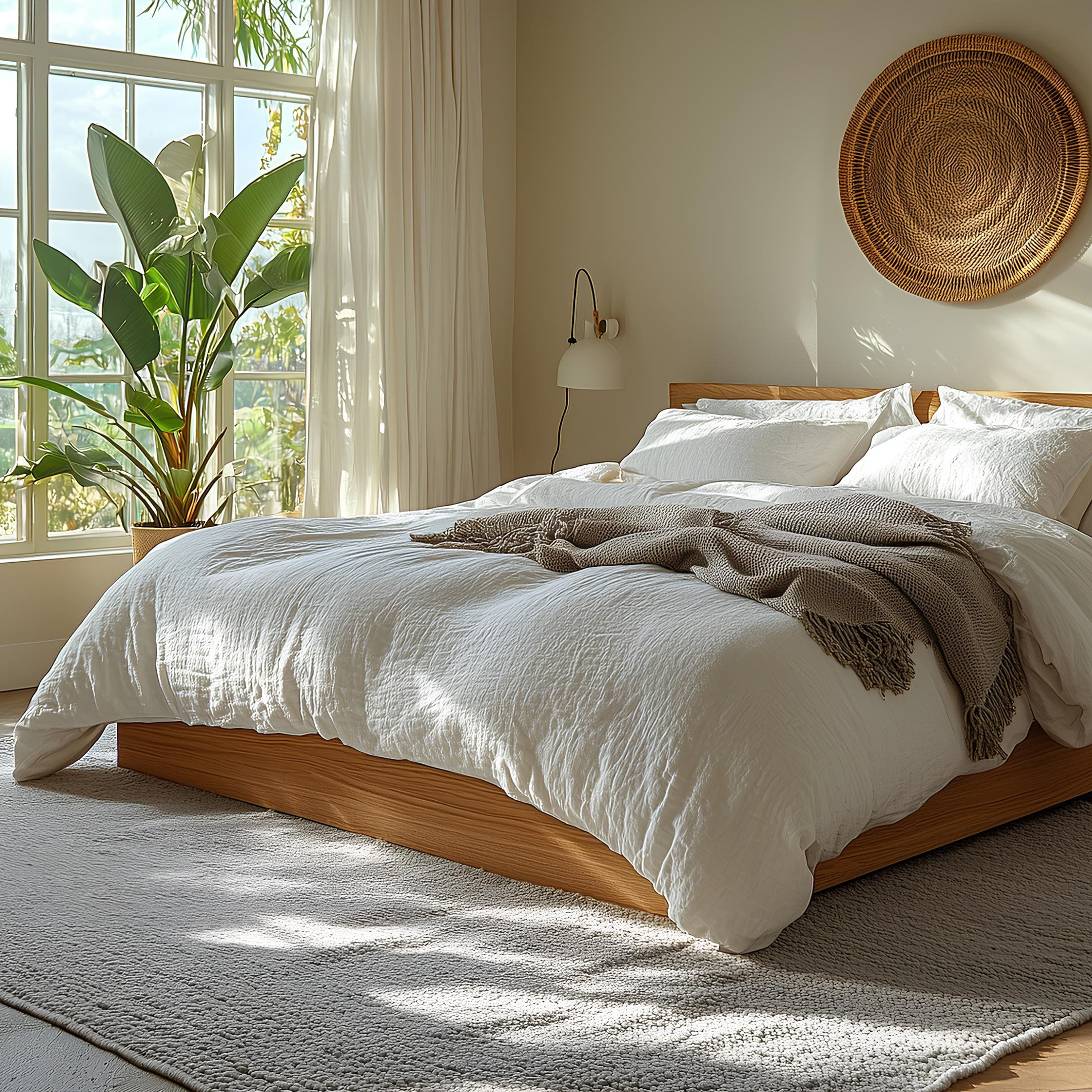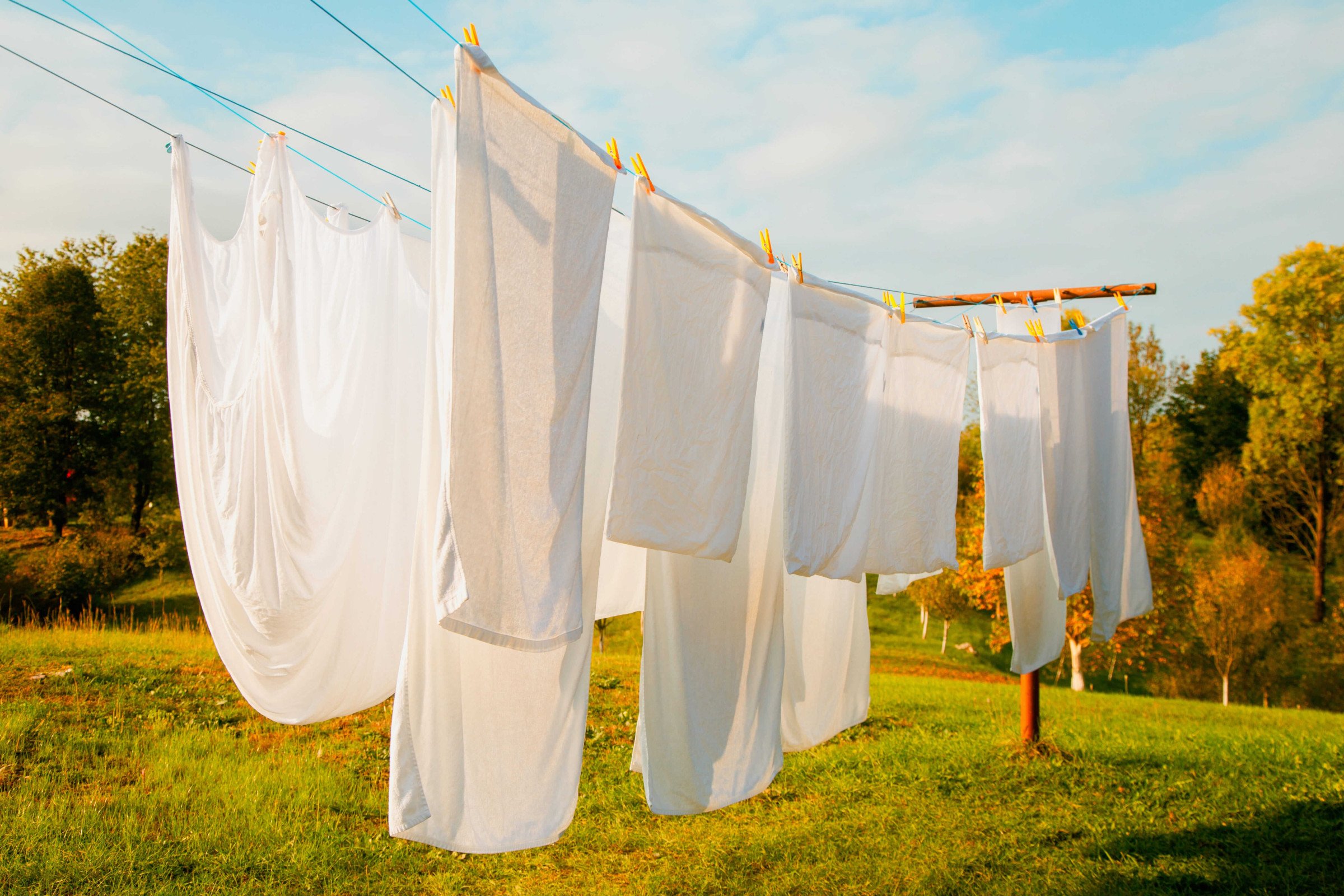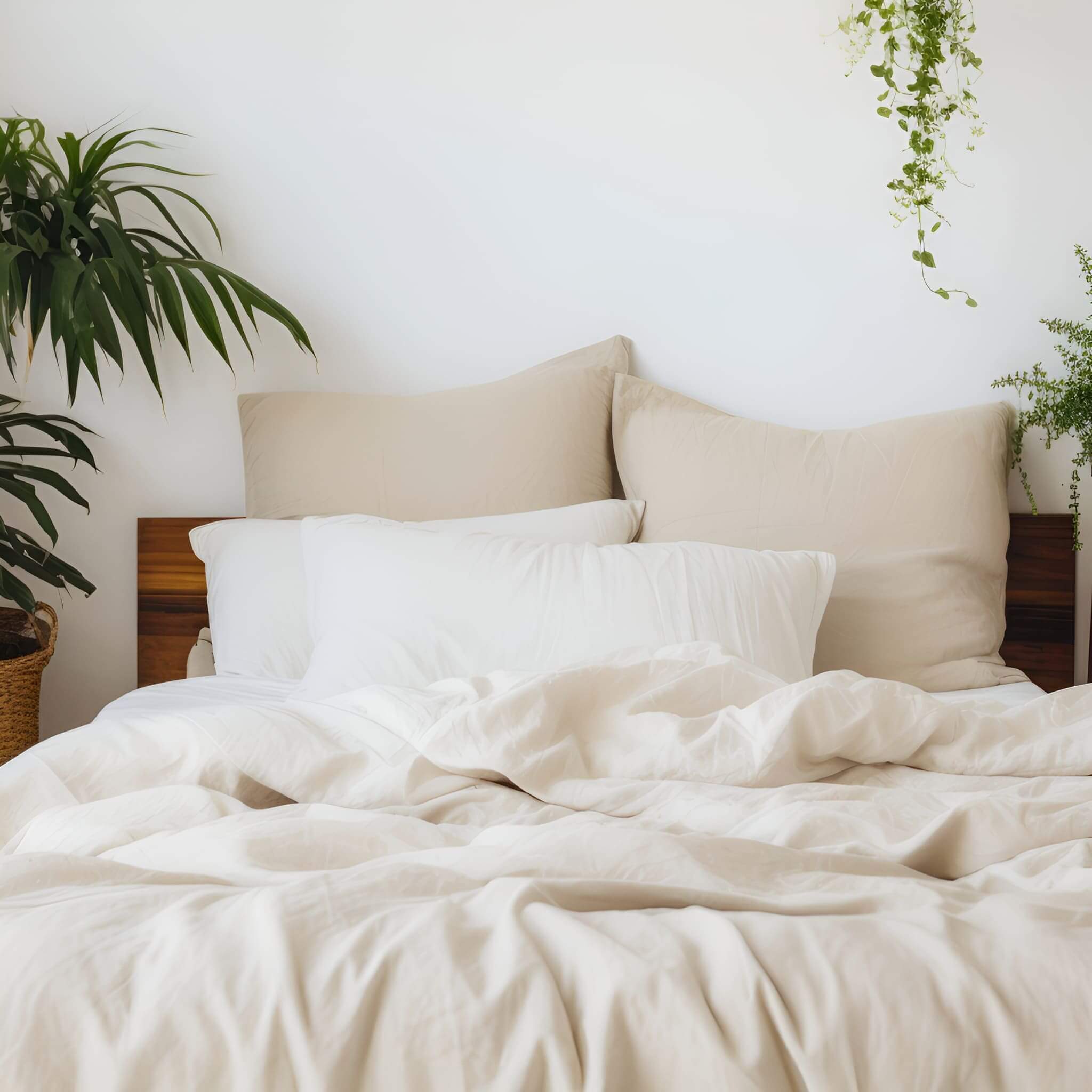The Best Organic Sheets for a Natural, Restful Sleep
Do you ever wake up feeling sticky, restless, or just off—like your sheets work against you rather than with you? You’re not alone. Many people struggle with overheating, skin sensitivities, or simply a lack of comfort in bed. The truth is that the wrong sheets can disrupt your sleep, leaving you groggy and frustrated.
If you’re searching for the best organic sheets, you’re likely looking for something more—comfort that soothes, materials that breathe, and bedding that aligns with your values. But with endless options, how do you find the right ones? Let’s make it easy.
Why Your Sheets Might Be Ruining Your Sleep
Have you ever woken up drenched in sweat, tossing and turning, or dealing with skin irritation? Conventional bedding might be the culprit:
- Harsh chemicals: Many sheets are treated with synthetic dyes and finishes that can trigger allergies and skin reactions.
- Overheating: Non-breathable materials trap heat, leaving you stuck in a cycle of night sweats and poor sleep.
- Low-quality fabrics: Cheap, synthetic sheets pill, wear out quickly, and don’t provide the comfort your body craves.
The Toxic Truth About Conventional Sheets
Did you know that many conventional sheets are processed with formaldehyde, flame retardants, and petroleum-based dyes? These chemicals don’t just impact your skin; they can also off-gas into the air you breathe while you sleep. That’s why switching to the best organic sheets isn’t just about luxury—it’s about your health.
When it comes to regular sheets, the production process is laden with chemicals that serve various functions:
- Pesticides and Herbicides: Conventional cotton is one of the most chemically intensive crops, using significant amounts of synthetic pesticides and herbicides to ward off pests and weeds.
- Dyes: Regular sheets often feature synthetic dyes that can contain harmful chemicals and heavy metals, contributing to environmental and health concerns.
- Bleaching Agents: To achieve that desired crisp white look, many sheets undergo a bleaching process with chemicals like chlorine or hydrogen peroxide.
- Chemical Finishes: It's common to find finishes on sheets that utilize formaldehyde for wrinkle resistance, perfluorinated chemicals (PFCs) for water and stain repellency, and antimony, which is used in polyester production.
- Softeners and Brighteners: These are often added to enhance feel and appearance but can leave behind chemical residues.
On the flip side, organic cotton sheets focus on reducing chemical exposure and environmental impact:
- Natural Farming Practices: Organic cotton is grown without synthetic chemicals, relying instead on crop rotation and natural pest control methods.
- Safer Dyeing: While not all organic sheets are undyed, they often use natural or low-impact dyes free from harmful toxins and heavy metals.
- Gentle Bleaching: Many organic sheets avoid harsh bleaching agents, opting for safer, oxygen-based alternatives.
- Minimal Chemical Treatment: Organic sheets typically avoid harmful chemical finishes, preferring water-based or safer compounds if any treatments are applied.
- Natural Softness: By leaning on the inherent softness of organic cotton, these sheets often sidestep chemical softeners, using mechanical methods instead.
While regular sheets may offer a range of appearances and affordability, they bring a host of chemicals that could pose environmental and health risks. By opting for organic cotton sheets, you're choosing minimal chemical intervention and a commitment to eco-friendly practices, offering peace of mind for both you and the planet.
The good news? Organic sheets solve these problems.
Evolution and Impact of Conventional Cotton Farming
Emergence of Industrial Practices
In the years following World War II, cotton farming underwent significant transformation. The primary driver was the pursuit of increased productivity, fueled by technological innovations. Farmers began to adopt synthetic pesticides and herbicides, alongside genetically engineered seeds, all of which promised higher yields.
Environmental Consequences
While these changes led to a marked boost in cotton output, they also introduced a cascade of environmental challenges. The aggressive use of chemicals in farming processes led to:
Soil Degradation: Over-reliance on chemical inputs has deteriorated soil quality, stripping it of essential nutrients and reducing natural fertility.
Water Pollution: Runoff from treated fields entered waterways, contaminating them with toxic chemicals and posing risks to aquatic life.
Biodiversity Loss: The modified farming landscape, dominated by monocultures, diminished habitat diversity, adversely affecting local ecosystems and wildlife populations.
Each of these factors highlights the need for re-evaluation of cotton farming practices to balance productivity with environmental stewardship.
The Softest, Most Breathable Sheets for Deep Sleep
Imagine slipping into bed and feeling instant relief—soft, airy fabric that hugs your skin without overheating. Here’s how to find that perfect match:
- Best natural sheets: Wool and organic cotton provide plush, breathable comfort.
- Softest organic sheets: Long-staple organic cotton or bamboo blends offer a silky-smooth feel.
- Best organic linen sheets: Ideal for hot sleepers, linen naturally wicks moisture and keeps you cool.
Understanding Thread Count in Sheets: What’s Its True Significance?
When it comes to buying sheets, thread count is a term that frequently comes up. It refers to the number of threads woven into a square inch of fabric. Many people assume that a higher thread count means better quality, but that's not always the case.
The Ideal Thread Count
For a blend of softness and durability, a thread count between 200 and 400 is generally ideal. Within this range, sheets typically offer a good balance that feels comfortable and can withstand regular use. However, going beyond that range doesn't necessarily equate to higher quality.
More Than Just Numbers: Fiber and Weave Quality
While thread count plays a role, it's the quality of the fibers and the type of weave that often have a greater impact on the sheets' comfort and longevity. For instance, sheets made from high-quality cotton, such as Egyptian or Pima, can offer a luxurious feel even at a lower thread count. Moreover, sateen and percale weaves can affect the texture and breathability of the sheets.
Final Thoughts on Thread Count
In summary, while thread count is a factor in determining the quality of sheets, it should not be the sole criterion. Instead, consider it alongside other important aspects like fiber quality and weave type to make a well-informed decision for your bedding needs.
How to Choose the Right Fabric for Your Needs
- If you tend to overheat: Opt for organic cooling sheets with moisture-wicking properties.
- If you have sensitive skin: Look for best non-toxic sheets made from 100% organic, dye-free cotton.
- If you want luxurious softness: Best organic linen sheets offer an airy yet durable feel that softens over time.
If you’re a hot sleeper, you need organic cooling sheets that regulate temperature and wick away sweat, helping you stay dry and comfortable all night long.
Can You Get Quality Without the Luxury Price Tag?
Switching to organic doesn’t have to mean breaking the bank. Plenty of affordable organic bed sheets offer high-quality sleep without the premium price:
- Affordable organic sheets: Look for GOTS-certified cotton or hemp sheets that offer durability without the luxury markup.
- Best natural fiber sheets: Wool, linen, and organic cotton provide longevity at a fair price.
Evolution of the Organic Sheets Market
The market for organic sheets is experiencing significant growth, fueled by rising consumer interest in eco-friendly products. As of 2021, the entire organic cotton market was valued at around $7.58 billion and is anticipated to soar to nearly $15.98 billion by 2027, according to Allied Market Research. A significant portion of this growth is attributed to organic sheets, as they are becoming staples in homes prioritizing sustainability.
Key Drivers for Growth
Environmental Awareness: Consumers are increasingly recognizing the environmental benefits of organic sheets. These products generally involve less water and no harmful chemicals in their production, which leads to a more sustainable textile industry.
Health and Wellness Trends: There's a growing demand for products that promote better health and sleep quality. Organic sheets offer hypoallergenic properties and are free from synthetic dyes and pesticides, appealing to health-conscious buyers.
Shift Towards Natural Products: As a part of a broader movement towards natural and organic home goods, organic sheets are gaining traction. This trend reflects a shift in consumer preferences for more natural and less processed products.
The Role of Certifications
Certifications are becoming more crucial, offering consumers assurance that their purchases are both authentic and ethically sourced. Trustworthy labels such as GOTS (Global Organic Textile Standard) and OEKO-TEX ensure that products meet rigorous environmental and social criteria. As consumers become more savvy and demand transparency, these certifications play a pivotal role in influencing buying decisions.
In summary, the organic sheets market is on an upward trajectory, driven by environmental consciousness and the pursuit of healthier living solutions. As these trends continue to evolve, the demand for certified, sustainable options is likely to increase, solidifying the market's growth.
Why Cheap Sheets End Up Costing You More
It’s tempting to grab the cheapest set of sheets you can find, but low-quality bedding wears out fast. Synthetic fibers pill, lose softness, and trap heat—meaning you’ll end up replacing them sooner than expected. Investing in the best organic bed sheets means:
- Longer-lasting durability
- Less waste, more sustainability
- Better comfort for years to come
Organic cotton products typically come with a heftier price tag compared to conventional cotton sheets. This is due to the more labor-intensive farming practices and the costs associated with obtaining organic certifications. However, the benefits justify the investment.
Good sleep shouldn’t be a privilege—it should be a standard. By choosing organic sheets, you're not just buying bedding; you're investing in quality, comfort, and a sustainable future.
Which Sheets Do People Actually Love?
With so many choices, reviews matter. These are some of the top-rated organic sheets based on real customer experiences:
- Best organic sheets reviews: Highly rated options with breathability, softness, and durability.
- The best organic sheets: GOTS-certified, responsibly made, and luxuriously comfortable.
- Top organic sheets: Prioritize moisture-wicking and thermoregulation for better rest.
What factors should be considered when assessing the transparency and ethics of a brand selling organic?
When investing in organic sheets, understanding the transparency and ethical standards of the brand is crucial. Here are the key factors to assess:
Supply Chain Visibility
Transparency begins with a clear picture of the supply chain:
- Origin of Materials: Determine where the brand sources its cotton or other organic materials. A reputable brand will provide detailed information about the farms and regions their materials come from.
- Manufacturing Locations: Brands should disclose where their sheets are manufactured and the steps involved in the production process.
Ethical Labor Practices
Ethical sourcing goes beyond materials:
- Fair Wages: Look for brands that guarantee fair compensation to workers throughout the supply chain.
- Working Conditions: Ensure that all factories comply with safety standards and provide humane working conditions.
- Certifications: Seek out brands certified by organizations like Fair Trade, which ensures ethical treatment of workers.
Environmental Responsibility
A commitment to sustainability is crucial:
- Sustainable Farming: Brands should prioritize sustainable farming methods, such as organic and regenerative practices that promote soil health and biodiversity.
- Eco-friendly Production: Verify if the brand uses processes that minimize water usage and waste, and opts for non-toxic, low-impact dyes.
Product Integrity Certifications
Certifications offer credibility:
- GOTS: The Global Organic Textile Standard ensures the product is composed of at least 95% organic fibers and aligns with stringent environmental and social criteria.
- OCS: The Organic Content Standard tracks the exact percentage of organic material in the product, assuring that claims are credible.
Company Policies and Values
Explore the brand's ethos and commitments:
- Transparency Reports: Some brands publish detailed reports on their environmental impact, labor practices, and sustainability goals, offering insights into their operations.
- Community Engagement: Select brands that engage in philanthropic efforts, support local communities, or reinvest in environmental causes.
Consumer Feedback and Reputation
Finally, rely on the experiences of others:
- Customer Reviews: Check for transparent and consistent feedback from actual buyers, focusing on both product satisfaction and company ethics.
- Industry Reputation: Research how the brand is perceived within the industry, including any awards or recognitions related to its ethical practices.
By considering these factors, you can make an informed decision, ensuring that your purchase supports brands prioritizing transparency and ethical standards in the production of organic sheets.
What to Look for in Customer Reviews
- Comfort over time: Do the sheets get softer after multiple washes?
- Breathability: Do they regulate temperature well?
- Durability: Are customers reporting fraying or pilling after a few months?
Considering different fibers? Bamboo and eucalyptus sheets are also eco-friendly alternatives, offering sustainable comfort.
Sleep is Too Important to Settle for Bad Bedding
You deserve a bed that welcomes you in, not one that leaves you tossing and turning. If your sheets leave you uncomfortable, it’s time for a change.
If you run hot, choose organic cooling sheets. Want something that gets softer over time? Best organic linen sheets are a dream. Need a budget-friendly option? Affordable organic bed sheets have you covered.
Investing in Your Sleep Health
Most people spend a third of their lives in bed—yet they rarely think about their sheets. The right bedding can transform your sleep quality, energy levels, and even skin health. Don’t wait until another restless night convinces you to upgrade.
Choosing the best natural bed sheets is about more than just fabric—it’s about reclaiming the deep, restorative sleep your body craves.
Organic Cotton Sheets – Soft, Breathable & Sustainable

$189.00
Sleep should feel like coming home. Our soft organic cotton sheets set don’t just feel softer—they are softer, thanks to the low-impact, regenerative farming methods that nurture the land and the fibers it produces. Grown without harmful chemicals, the cotton retains… read more
Exploring the Pros and Cons of Organic Cotton Sheets
Choosing organic cotton sheets involves balancing environmental values with practical considerations. Here's a comprehensive look at the benefits and drawbacks.
Pros of Organic Cotton Sheets
Eco-Friendly Production: Organic cotton stands out for its sustainable farming practices. Grown without synthetic pesticides or GMOs, it aids in keeping the soil healthy and minimizes water pollution, supporting a cleaner ecosystem.
Gentle on the Skin: If you have sensitive skin or allergies, organic sheets can be a gentler option. They usually lack the harsh chemicals and dyes found in conventional sheets, potentially reducing allergy risks and skin irritations.
Ethical Manufacturing: Many producers of organic cotton adhere to ethical practices. Certifications like the Global Organic Textile Standard (GOTS) ensure that both environmental laws and social responsibility are part of the production process, leading to better working conditions and fair wages.
Longevity: These sheets can be more durable due to the absence of degrading chemical treatments. With the right care, they maintain their softness and comfort over time, offering a good long-term investment.
Enhanced Sleep Quality: Organic cotton has natural breathability, which enhances airflow and helps regulate body temperature. This can result in a cooler and more restful night’s sleep.
Cons of Organic Cotton Sheets
Higher Price Point: Organic cotton sheets often come with a higher initial cost. The labor-intensive nature of organic farming and the expense of certifications contribute to their premium pricing.
Limited Availability: Depending on your location, finding a diverse range of organic options might prove difficult. Traditional sheets tend to dominate the market, making organic sheets less accessible in some areas.
Specialized Care Needs: Maintaining the quality of organic cotton often requires specific washing instructions. This can mean more effort in terms of laundry compared to conventional sheets.
Inconsistent Standards: Not all organic labels are equal. Different countries and certification bodies define "organic" differently, leading to variations in quality and authenticity among products.
Aesthetic Considerations: Without chemical enhancements, organic sheets may lack the silky smooth look of traditional sheets. Some might perceive this as a decrease in luxury, although personal preference will vary.
In summary, while organic cotton sheets offer environmental and personal health benefits, there are practical considerations around cost, care, and availability. Your decision will ultimately depend on balancing these factors with your individual preferences and values.
The Right Sheets Can Change Everything
Your bed should be a sanctuary. Investing in the best organic sheets means more than just better sleep—it means waking up refreshed, energized, and ready to take on the day.
Ready to Upgrade? Here’s What to Do Next:
Assess your sleep needs – Do you need cooling sheets? Hypoallergenic materials? A luxurious feel?
Check for certifications – Look for GOTS, OEKO-TEX, and Fair Trade labels to ensure you’re getting true organic quality. These certifications verify that the product meets stringent environmental and social standards, providing peace of mind that your sheets are genuinely organic.
Read reviews carefully – What do real customers say about softness, breathability, and durability? Dive into third-party reviews on independent platforms to gain insights into the product’s authenticity and performance.
Invest in sleep, not just sheets – The right bedding improves your health, comfort, and overall well-being. Genuine organic sheets might come at a higher price point due to the sustainable farming practices involved, but the investment in quality sleep is well worth it.
Understand thread count misconceptions – Don’t be swayed by high thread counts alone. Some manufacturers artificially inflate these numbers. Instead, focus on the quality of the fiber and its certification to ensure durability.
Research the brand – A brand committed to organic values will provide detailed information on their sourcing, production process, and certifications. Transparency reports and ethical policies are good indicators of genuine dedication.
Scrutinize the fine print – Watch out for vague terms like ‘natural’ or ‘eco-friendly’. These don’t necessarily mean organic. Check the product details to confirm the percentage of organic fibers used.
Ask questions – Don’t hesitate to inquire directly with manufacturers or retailers about the origin of the cotton, details on the supply chain, and any third-party verifications.
Feel and smell – Authentic organic sheets should feel breathable and soft, without any chemical smell. If you notice a distinct chemical odor, it might indicate the use of conventional treatments.
If you’re tired of waking up in a pool of sweat or dealing with scratchy, uncomfortable bedding, now is the time to upgrade. Explore our collection of top organic sheets today and feel the difference of truly regenerative, organic materials.
Sleep Better, Live Better
When you invest in organic sheets, you're not just improving your sleep—you’re making a conscious choice for your health and the planet. Every night, you’ll feel the difference as you rest in clean, breathable, and sustainable bedding. Wake up feeling refreshed, knowing you’ve taken a step towards a healthier home and a better world. The best sleep of your life starts with the best organic sheets—why wait any longer?





